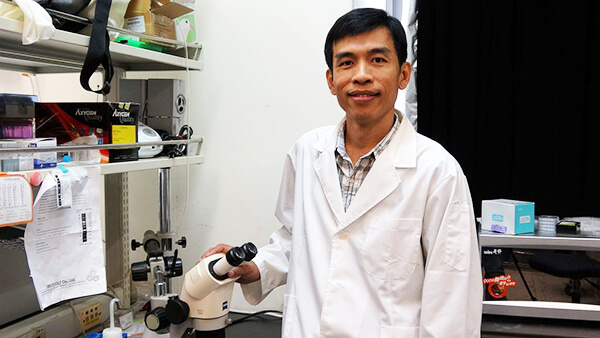Transposon sheds light on genes associated with developmental brain diseases
The Laboratory of Neural Development and Stem Cell Research at the National Yang-Ming University identified 33 candidate genes associated with developmental brain diseases by screening transposon-mediated somatic mutagenesis. The study of this innovative genetic screening method and clinical discovery was published on Nature Communications.
By Joanne Shih
Many studies have proved that pediatric brain dysfunctions are associated with genetic mutations. Genetic mutations involved in the normal migration and function of cortical neurons often lead to developmental brain disorder, as known as malformations of cortical development (MCDs). MCDs can tremendously affect brain and neurological function, and often result in disorders such as autism, epilepsy, intellectual disability, developmental delay, microcephaly (small brain), and macrocephaly (large brain). However, many causal mutations involved in cortical development remain unknown.

“It is very difficult to identify genetic mutations causing developmental brain diseases, because most mutations happen in brain and it is hard to screen through every single gene” said Dr. Jin-Wu Tsai, the principle investigator and associate professor at the Institute of Brain Science at National Yang-Ming University. Inspired by Nobel laureate Dr. Barbara McClintock’s research in transposons, also known as “jumping genes”, Dr. Tsai and his team invented an in vivo genetic screening method based on transposon-mediated somatic mutagenesis.
In addition to developing the innovative screening method which can greatly shorten the time required for detecting mutant genes, Tsai’s team took a step forward to find out the clinical relevance of these 33 candidate genes associated with MCDs. They analyzed somatic mutations in brain tissue from patients with related disorders, and as a result they found that gene mutations are enriched in these identified candidate genes.
The research team has been collaborating with Taipei Veterans General Hospital, and helped pediatricians to screen and select treatment for patients with pediatric epilepsy. The new screening method and clinical finding are fundamental to developing potential indicators for early detection, diagnosis, and treatment for brain diseases.
Reference
- Lu IL, Chen C, Tung CY, et al. Identification of genes associated with cortical malformation using a transposon-mediated somatic mutagenesis screen in mice. Nat Commun. 2018 Jun 27;9(1):2498. doi: 10.1038/s41467-018-04880-8
- Institute of Brain Science, National Yang-Ming University
- The Laboratory of Neural Development and Stem Cell Research
- http://www.bcc.com.tw/newsView.3120953
- https://www.youtube.com/watch?v=fmPM2eIOPjg
©www.geneonline.com All rights reserved. Collaborate with us: service@geneonlineasia.com











